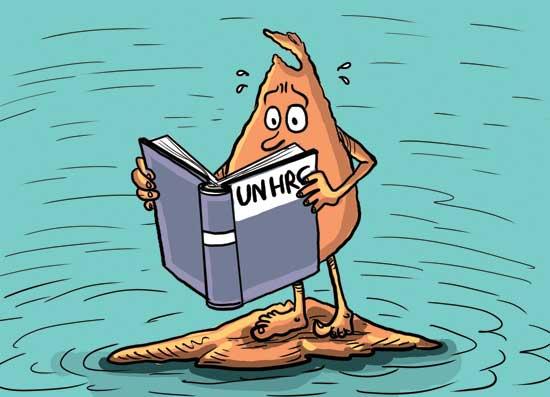Reply To:
Name - Reply Comment
On Friday February 26, the government finally lifted the ban on burial of patients who die of the coronavirus. It gave no reason for the sudden turnaround.
gave no reason for the sudden turnaround.
To the Muslim community, who steadfastly opposed the ban in that it infringed their religious duties, customs and traditions, it was a victory well deserved.
The Christian community too, which has opposed the concept of cremation traditionally, did not officially join their Muslim brethren in their protests.
The state on the other hand, had from the time of its implementation of the ban on burial rights for the victims of corona virus, the sudden ‘volta-face’ or abrupt and complete reversal of attitude is shameful and embarrassing.
What on earth is going on? In March last year, the government without any second thought, ordered that bodies of persons suspected to have died of coronavirus, be cremated - irrespective of their religious beliefs, traditions or customs.The government’s ban on burial of patients dying of Covid-19, for fear of the virus spreading via contamination of ground water was not based on scientific or medical knowledge provided either by local medical bodies or international medical evidence.
In fact, all medical evidence emphatically rejected the possibility of groundwater contamination via the burying of Covid-19 patients.
In the aftermath of its sudden walk back on its earlier steadfast approach as a means of controlling the spread of the virus, the measure appears to be based on demands of very small group of vituperative vocal religious leaders with an anti-Islam anti minority attitude. It would appear that this particular group had the blessing of particular powerful politicians with axes to grind within the ruling party.What makes this sudden decision more unpalatable is, the timing of government policy. We Sri Lankans are facing, to put it mildly, an uncomfortable time at the United Nations Human Rights Council (UNHRC) sessions being held Geneva.
Firstly, Sri Lanka stands accused of grave violations of human rights in the last stages of the civil war (1983 - 2009). Additionally, this country is seen to have withdrawn unilaterally, from past agreements - resolution 30/1 - (which the previous government co-sponsored with member states of the world body) to work with the international community. Our country is also charged of ongoing mistreatment of minorities via regulations on the disposal of remains of Covid-19 patients.
The Office of the OHCHR in its latest report dated January 27, 2021 titled ‘Sri Lanka On Alarming Path Towards Recurrence of Grave Human Rights Violations’ says the High Commissioner is deeply concerned over the trend, and could represent an early warning sign of a deteriorating human rights situation.
The Commissioner points out the WHO guidelines stress that cremation is a ‘cultural choice’ and is concerned over the lack of concern and sensitivity to different communities and their religious and cultural practices. Christians and Muslims in this country have traditionally opposed the cremation of bodies.
During the initial stages of the pandemic, when not too much was known of the disease and its spread, sections of the Christian community did not oppose the government’s decision to cremate.
The Muslim community however, always opposed cremation based on their religious teachings. The community was largely responsible for de-mysticising myths regarding the spread of the virus via their tenacity. Despite the WHO and local medical associations throwing their weight to debunk false theories of the spread of the virus, political leaders for one reason or another decided to stick by their decision to ‘cremate’ come what may.
Even when Prime Minister Mahinda Rajapaksa announced in Parliament that government was lifting the ban on burial of Covid-19 victims on February 10, the State Minister of Health had the ‘gumption’ to contradict him in parliament itself, on February 21. O tempora, O mores was it a case of power blindness. Perhaps the minister did not understand the hurt, the ban on burial caused to the country’s minorities. Perhaps that minister did not take the former President seriously.
Whatever the reason, it appears, the government’s change of direction has been brought about in the face of the ongoing pressure from the UNHCR sittings in Geneva. The demands of the Organization of Islamic Countries (OIC) to lift the ban on burial on Covid-19 victims; the arrival of Pakistan Prime Minister Imran Khan, who was also calling for the rights of Muslims to bury their dead and protests and demonstrations organized by the local Islamic community and activists.
Who was responsible for this latest shame that is heaped on our country?